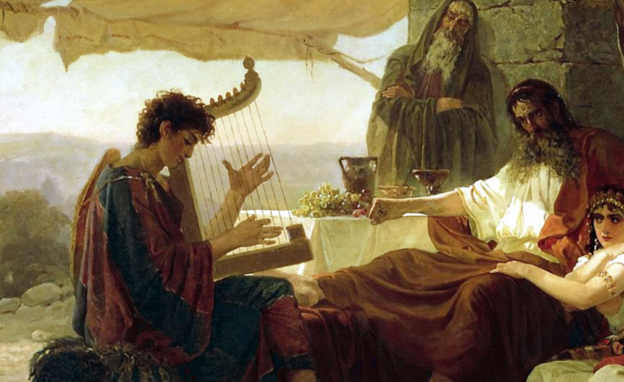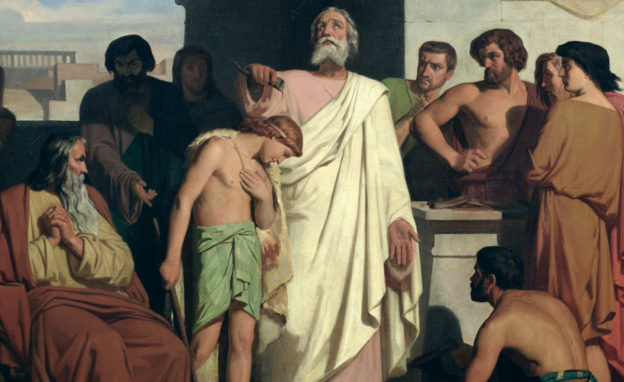One of the “assumed truths” of our world today is the belief that we are the lead actors in our story. So we are the champions in the battles we fight against whatever cause. Unfortunately, this attitude can creep into the Church and we assume stories like David and Goliath are about us. Nothing is further from the truth. David and Goliath is about God defeating our real enemies.
In this climactic scene of the confrontation between David and Goliath, we are reminded first of all that the Battle Belongs to God. God is the one who is victorious, and was victorious over sin and death through Jesus Christ. God’s victory is comprehensive and definitive, and one day will be complete.
Young David, who recognised the true spiritual nature of the conflict between Israel and the Philistines, entered onto the arena of battle after rejecting Saul’s armour and weaponry (vv.1-40). Armed with only a sling and five smooth stones, he approached the giant Goliath.
Goliath the Philistine, moved forward to meet his foe (v.41). Five times in verses 41-44, the passage refers to “the Philistine”. Goliath’s menace and imposing status is meant to come through. Goliath played on his physical prowess, like some BC giga-chad.
Goliath looked on the outside. A good thing full length mirrors did not exist, or he would have been delayed. Goliath saw David as “but a youth, ruddy and handsome in appearance” and sneered (v.42). Goliath jeered at David, saying “Am I a dog, that you come to me with sticks?” and cursing him by his false gods (v.43). He suggested David would make good food for the hungry scavengers circling above (v.44).
Pride, striding the earth. A haughty spirit, ready for a fall (Prov. 16:18).
David talked smack back to Goliath. Goliath was striding out in his own strength, with his own weapons, but David came relying on God (v.45). Hardly a fair fight. Goliath was a blasphemer and a rebel. David came in God’s name, his conduct and character, “whom you have defied” (v.45).
Because Goliath defied God, he was guilty of the punishment due for his sin – death (v.46). God would give him into his hand. He would cut off Goliath’s head, interesting considering he had no sword. And the Philistine army would become the scavenger food.
This would happen so that “all the earth may know that there is a God in Israel”, and that Israel itself would know that “the Lord saves not with sword and spear” (v.47). Ultimately, the battle did not belong to strength or skill of arms but “the battle is the LORD’s, and he will give you into our hand” (v.47).
The actual battle itself is pretty much an anti-climax. Goliath drew near to David at the battle line, David whipped out a stone, flung it with his sling at 200kph into Goliath’s forehead, and the great enemy was dead before hitting the floor (vv.48-9).
Weakness prevailed over strength, because physical strength is no match for God; David won without even a sword in his hand (v.50). He had to borrow Goliath’s to remove his head, and this act caused the Philistines to flee (v.51).
From there, the actual soldiers took over, slaying the fleeing Philistines all the way back home, and then plundered the abandoned Philistine camp (vv.52-3).
David, on the other hand, took the head of Goliath to Jerusalem, then paraded it to its pagan inhabitants (v.54). In other words, if God could knock off the great Goliath, they had better watch out. God had unfinished business with those who opposed his reign and his people.
The emphasis on David’s weakness, and the lack of emphasis on the actual battle, shows the emphasis should go on God, not David. Not us. God gave the victory, the battle belonged to him.
Israel could not save themselves. Israel needed a saviour to fight on their behalf, and defeat God’s foe. That saviour, for Israel, was the anointed king David who dispatched Goliath.
Yet this was just a lesson for them, just as it is for us. It pointed to something greater. Goliath represented opposition to God. The truer and greater enemy is sin and death. Jesus, the anointed king descended from David, is the true victor and Saviour of God’s People.
Jesus relied on God in faith, just as David did, even as Jesus was nailed to the Cross for our sins. He defeated sin and death in a worldly weak way, by dying meekly on a cross. Yet he was triumphant, because the battle belonged to God.
That victory reminds us that the opposition of the world, in whatever shape it takes, is ultimately nothing compared to God’s power. We do not need to fear the world, for our Champion has already won the battle. All that is left for us, like the Israelite army, is the cleanup.
Trusting in Christ our Saviour, we can fight against sin knowing the battle belongs to God, and seeking to glorify him.




